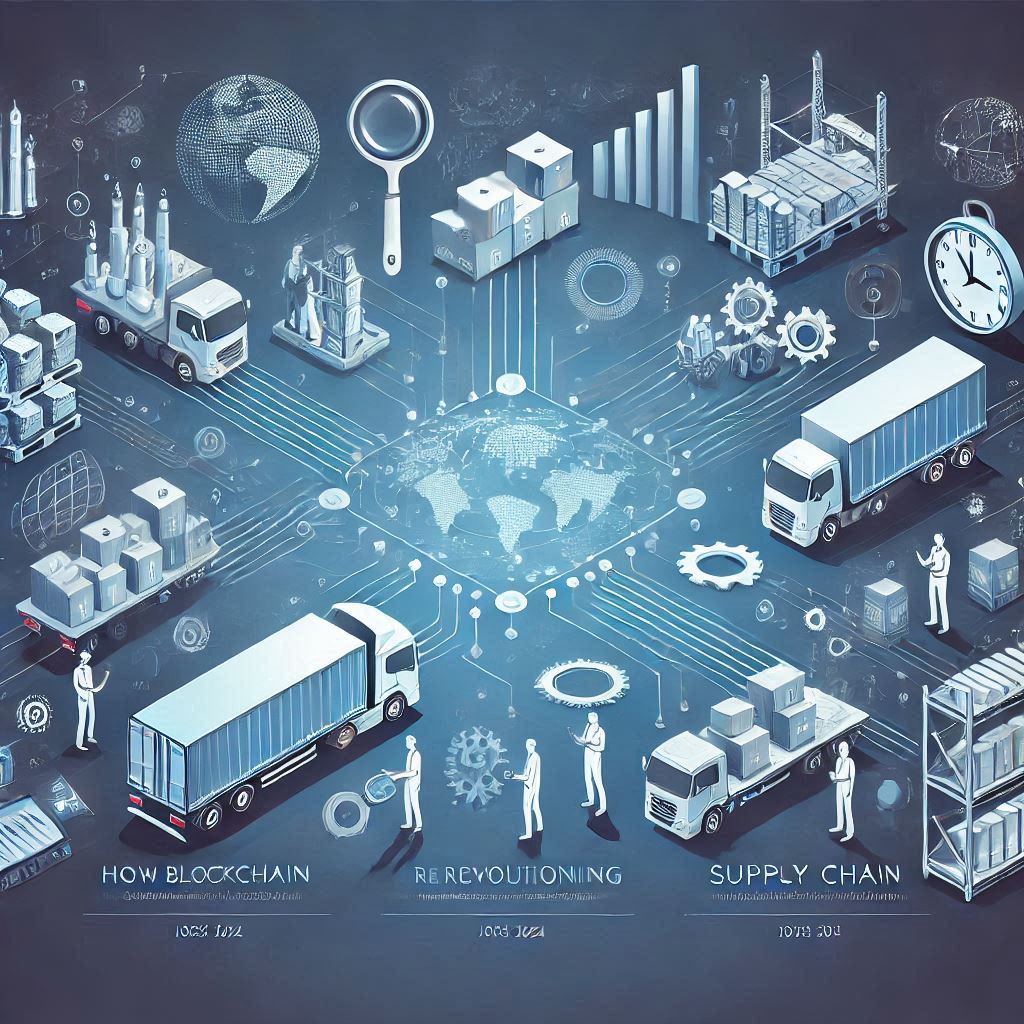Blockchain technology is a decentralized ledger system that records transactions across multiple computers. It provides a secure and transparent way to track assets and verify transactions. This technology has found its way into various industries, including supply chain management, due to its ability to provide immutable records.
In supply chain management, blockchain can track the journey of products from their origin to the end consumer. It ensures that every step of the process is recorded and can be verified. This transparency helps in reducing fraud, errors, and inefficiencies in the supply chain.

Enhancing Transparency in Supply Chains
One of the biggest advantages of blockchain in supply chain management is its ability to enhance transparency. Each participant in the supply chain can access the blockchain ledger and see the same information. This shared view helps in building trust among parties.
Transparency in the supply chain means that consumers can know the origin of the products they purchase. It allows them to make informed choices and ensures that the products are ethically sourced. Companies can also use this transparency to differentiate themselves in the market.
Reducing Fraud and Counterfeiting
Fraud and counterfeiting are significant problems in global supply chains. Blockchain technology can help in mitigating these issues by providing a secure and tamper-proof record of transactions. Each transaction is encrypted and linked to the previous one, making it nearly impossible to alter.
By using blockchain, companies can ensure that their products are genuine and have not been tampered with during transit. This is particularly important for industries such as pharmaceuticals, where the authenticity of products is crucial for consumer safety.
Improving Traceability and Accountability
Traceability is a critical aspect of supply chain management. Blockchain allows for real-time tracking of products as they move through the supply chain. This capability improves accountability and ensures that all parties involved are responsible for their actions.
In case of a recall, companies can quickly identify the affected products and trace them back to their source. This helps in minimizing the impact of recalls and ensures that consumers are not exposed to unsafe products. It also improves the overall efficiency of the recall process.
Streamlining Operations with Smart Contracts
Smart contracts are self-executing contracts with the terms of the agreement directly written into code. They run on the blockchain and automatically execute when the conditions are met. In supply chain management, smart contracts can streamline operations and reduce the need for intermediaries.
For example, a smart contract can trigger a payment as soon as a product is delivered. This reduces delays and ensures that suppliers are paid promptly. Smart contracts also reduce the risk of disputes, as the terms are clear and enforced automatically.
Enhancing Security with Decentralization
Blockchain technology enhances security through its decentralized nature. Unlike traditional systems that rely on a central authority, blockchain operates on a network of nodes. Each node has a copy of the ledger, and changes to the ledger must be approved by the majority of nodes.
This decentralization makes the blockchain more resistant to attacks. Even if a single node is compromised, the rest of the network remains secure. This high level of security is crucial for supply chain management, where the integrity of data is paramount.
Reducing Costs and Increasing Efficiency
Implementing blockchain technology in supply chain management can lead to significant cost savings. By eliminating intermediaries and reducing paperwork, blockchain streamlines processes and reduces administrative costs. It also increases efficiency by automating tasks through smart contracts.
Blockchain can also reduce the costs associated with fraud and counterfeiting. By ensuring the authenticity of products, companies can avoid the financial losses that come with counterfeit goods. Additionally, the transparency provided by blockchain can help in identifying inefficiencies and optimizing the supply chain.
Enabling Data Sharing and Collaboration
Blockchain facilitates data sharing and collaboration among supply chain participants. Since all parties have access to the same information, they can work together more effectively. This shared access also helps in resolving disputes and improving communication.
Collaboration is essential for optimizing the supply chain. By sharing data, companies can coordinate their efforts and make better decisions. Blockchain provides a secure and transparent platform for this collaboration, leading to improved outcomes for all parties involved.
Fostering Innovation and New Business Models
The adoption of blockchain technology in supply chain management is fostering innovation and enabling new business models. Companies are exploring ways to leverage blockchain to create value and gain a competitive edge. This innovation is driving the development of new solutions and services.
For instance, some companies are using blockchain to create decentralized marketplaces where suppliers and buyers can interact directly. These marketplaces eliminate the need for intermediaries and reduce transaction costs. Blockchain is also enabling new financing models, such as supply chain finance, which provides funding based on the value of goods in transit.
Enhancing Regulatory Compliance
Compliance with regulations is a critical aspect of supply chain management. Blockchain can help companies comply with regulatory requirements by providing a transparent and immutable record of transactions. This record can be easily audited, ensuring that companies meet their obligations.
Regulatory compliance is particularly important in industries such as food and pharmaceuticals, where the safety and quality of products are paramount. Blockchain ensures that all relevant information is recorded and can be accessed by regulators. This reduces the risk of non-compliance and the associated penalties.
Supporting Sustainable Practices
Sustainability is becoming increasingly important in supply chain management. Blockchain can support sustainable practices by providing transparency and traceability. Companies can use blockchain to verify the origin of raw materials and ensure that they are sourced responsibly.
Consumers are also demanding more information about the sustainability of products. Blockchain allows companies to provide this information, building trust with consumers and enhancing their brand reputation. By promoting sustainable practices, companies can differentiate themselves in the market and attract environmentally conscious consumers.
Addressing Challenges and Barriers
While blockchain offers many benefits for supply chain management, there are also challenges and barriers to its adoption. These include technical challenges, such as scalability and interoperability, as well as organizational challenges, such as resistance to change.
To overcome these challenges, companies need to invest in education and training. They also need to collaborate with other stakeholders and work towards developing standards and best practices. By addressing these challenges, companies can fully realize the potential of blockchain in supply chain management.
Case Studies: Successful Implementations
Several companies have successfully implemented blockchain technology in their supply chains. These case studies provide valuable insights and highlight the benefits of blockchain. For example, Walmart is using blockchain to track the origin of food products, ensuring their safety and quality.
Another example is IBM’s Food Trust platform, which uses blockchain to enhance transparency and traceability in the food supply chain. This platform has been adopted by several major food companies, including Nestle and Unilever. These case studies demonstrate the practical applications of blockchain and its impact on supply chain management.
The Future of Blockchain in Supply Chain Management
The future of blockchain in supply chain management looks promising. As the technology matures, we can expect to see wider adoption and more innovative applications. Companies that embrace blockchain will be better positioned to address the challenges of the modern supply chain.
In the coming years, we may see the development of new blockchain platforms and solutions tailored specifically for supply chain management. These solutions will provide enhanced functionality and make it easier for companies to implement blockchain. The future of supply chain management is digital, and blockchain is at the forefront of this transformation.
Conclusion: Embracing Blockchain for a Better Future
Blockchain technology is revolutionizing supply chain management by providing transparency, security, and efficiency. It is addressing some of the most significant challenges in the supply chain, from fraud and counterfeiting to regulatory compliance and sustainability.
As companies continue to explore and adopt blockchain, we can expect to see even greater benefits. By embracing blockchain, companies can build more resilient and efficient supply chains, ultimately leading to a better future for all.
know more
The Evolution of Cryptocurrency Exchanges: Security, Usability, and Innovation
Tokenization of Real-World Assets: Bridging Traditional Finance and Blockchain
Blockchain Interoperability: Connecting Multiple Blockchains for a Seamless Ecosystem
other website

